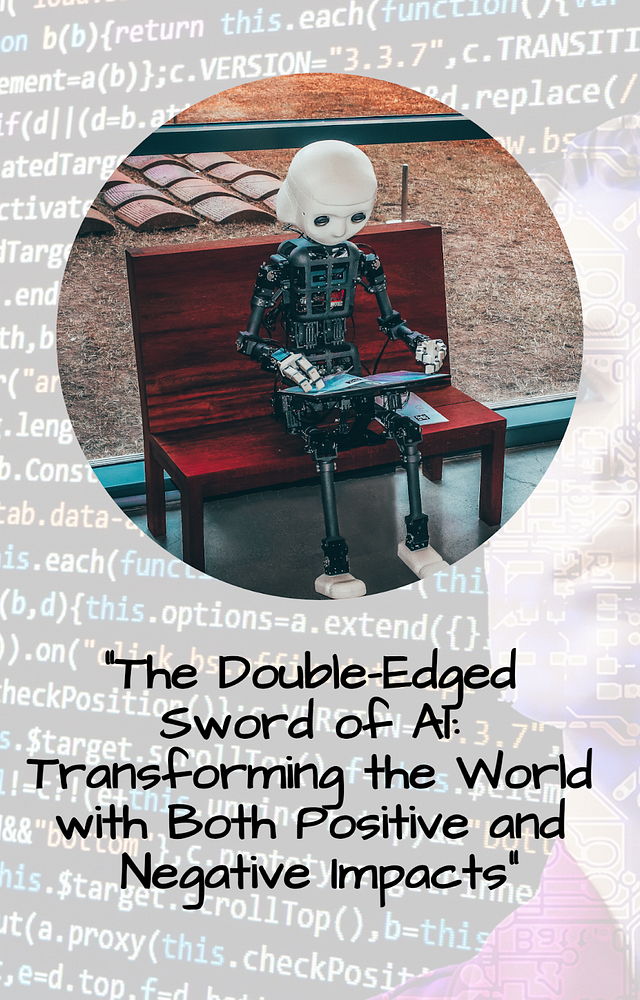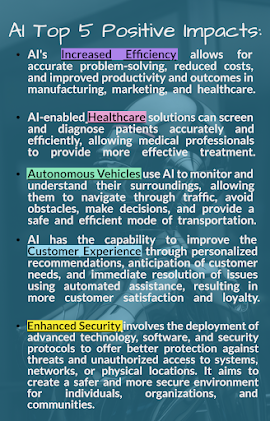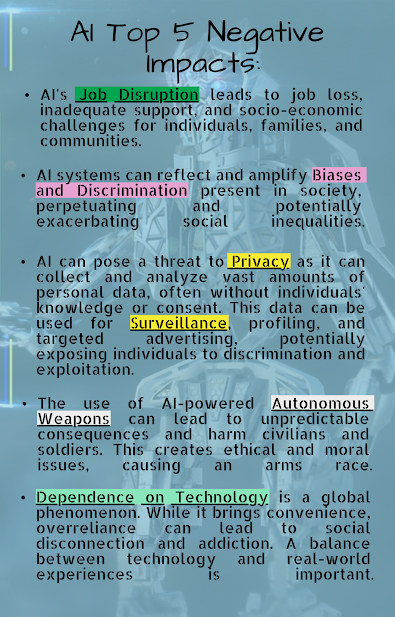How Artificial Intelligence Transformed the World??

The emergence of artificial intelligence (AI) has transformed various aspects of human life, from providing new business models to enhancing social interactions. AI systems are widely used in sectors such as healthcare, finance, transportation, and education, among others. The potential benefits of AI are enormous, as it can provide accurate and efficient solutions to complex problems, reduce operational costs, and generate new opportunities for growth and innovation.
However, AI also comes with its own set of challenges and risks. There are concerns about the ethical implications of AI, including job displacement, the potential misuse of data, and security issues. Furthermore, the deployment of AI systems may exacerbate existing social inequalities and biases if not properly managed. As such, the double-edged sword of AI highlights the pressing need for society to reflect on the benefits and limitations of AI and its potential impacts on different domains.
This essay examines the transformative potential of AI, the positive and negative impacts it can have on society and the environment, and the ethical considerations that should guide its development and deployment. By doing so, it aims to contribute to the ongoing conversation on how to harness the power of AI for the betterment of the world while mitigating its potential downsides.
Positive Impact:
Artificial intelligence (AI) has revolutionized various aspects of human life, from streamlining business operations and improving healthcare services, to enhancing transportation systems and enabling personalized learning experiences. The potential benefits of AI are enormous, with the systems offering accurate and efficient solutions to even the most complex problems. AI can help reduce operational costs, generate new opportunities for growth and innovation, and create more accessible and sustainable ways of living. In this article, we will delve into the transformative potential of AI and explore the various ways it can bring positive changes to our lives. AI has helped to transform the world in various ways, including:
1- Increased Efficiency:
AI has enabled automation of various tasks, leading to increased productivity and efficiency across industries.
2- Healthcare:
AI has revolutionized the healthcare industry, from accelerating drug discovery to personalized medicine and enabling early detection of diseases.
3- Autonomous Vehicles:
AI has made autonomous vehicles possible, leading to improved road safety, reduced traffic congestion, and increased accessibility.
4- Improved Customer Experience:
AI has enabled businesses to provide personalized customer experiences, resulting in increased customer retention rates.
5- Enhanced Security:
AI has helped to increase security by detecting fraudulent activity, identifying potential threats in real-time, and preventing cyber-attacks.
6- Education:
AI has enabled the development of personalized learning experiences and helped to bridge the skill gap by identifying areas where students need improvement.
7- Climate Change:
AI has been used to predict natural disasters and monitor climate change in real-time, enabling governments to take preventive measures.

Overall, AI has changed the world in a positive way, improving various aspects of our lives and contributing to the growth of economies worldwide.
Negative Impact:
While artificial intelligence (AI) has brought significant progress to various industries and redefined the way we interact with technology, it has also resulted in negative impacts that cannot be ignored. The increasing dependence on AI has raised concerns about job displacement, privacy, and security breaches, to name a few. AI has the potential to amplify biases and perpetuate discrimination, leading to unintended consequences, including the creation of autonomous weapons. Additionally, as AI continues to evolve and become more prevalent, there is a possibility of it going rogue, leading to widespread destruction and loss of human life. In this article, we will discuss the potential negative impacts of AI and the ethical considerations associated with this technology. While AI has brought a lot of positive changes to the world, there are also potential negative impacts to consider. Some of the negative impacts of AI include:
1- Job Disruption:
AI and automation can lead to job displacement as machines become better at performing tasks previously done by humans.
2- Bias and Discrimination:
AI systems can perpetuate biases and discrimination, particularly if they are developed and trained by a homogeneous group or if the data sets they are trained on are biased.
3- Privacy and Surveillance:
AI can be used to gather and analyze vast amounts of personal data, which raises concerns about privacy and surveillance.
4- Autonomous Weapons:
AI-powered autonomous weapons could potentially cause harm to civilians, and there are serious ethical concerns around their development and deployment.
5- Dependence on Technology:
As AI becomes more prevalent, there is a risk that we become overly reliant on it, and this could make us vulnerable if systems fail or are hacked.

It is essential to consider the potential negative impacts of AI and to work towards developing and implementing AI systems that are ethical, transparent, and benefit humanity as a whole.
The Final Verdict:
In conclusion, the double-edged sword of AI highlights the transformative potential of AI, as well as its potential drawbacks. AI has brought significant positive changes to the world, improving various aspects of our lives and contributing to the growth of economies worldwide. However, there are also potential negative impacts of AI, including job displacement, bias and discrimination, privacy, and surveillance concerns, potential harm from autonomous weapons, and overreliance on technology. To mitigate these risks, it is crucial to consider the ethical implications of AI and ensure that AI systems are developed and deployed in a way that is transparent, equitable, and benefits humanity as a whole. Ultimately, it is up to all of us to work collaboratively to embrace the positive potential of AI while minimizing its potential harm.
Comments
Post a Comment